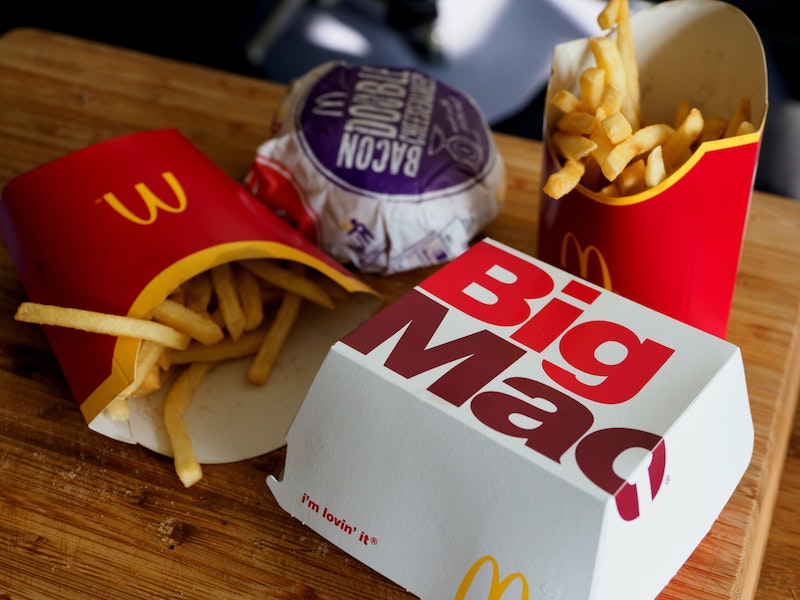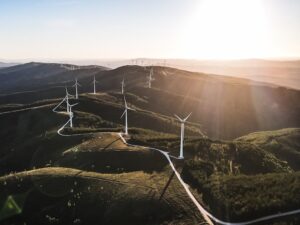Sustainability is a term that can mean many different things to lots of different people. The term’s vagueness is beneficial for companies who can appear to be embracing a sustainable approach, helping to enhance their reputation. But the fact of the matter is, no matter how hard some companies try, the core product or service they offer could never be part of a sustainable society. McDonald’s provides a case in point.
Why?
While companies have taken advantage of the vagueness of the term, a definition of a sustainable society is one where each person’s basic needs are produced within the Earth’s carrying capacity. Using this definition, many business models will always be unsustainable by design.
Take oil companies. No matter how hard they try, they can never be part of a sustainable world because as long as their core product remains oil, emissions of greenhouse gases will always be part of their business operations. No matter how hard they try, oil can’t be part of a sustainable future if we want to reach the target of net-zero.
Oil, by design, is not sustainable. And so, if oil companies don’t transition their business models and start producing other energy sources, they will (one day) become surplus to requirements as the world economy weans itself off oil. For oil companies to remain relevant in the future, they must transform their business to the point where they are no longer oil companies.
At first glance, it feels like there is no reason why McDonald’s couldn’t become part of a sustainable world.
But in just the same way as an oil company, no matter how McDonald’s adapts its business model, it’s hard to imagine it being part of a sustainable future. Unless, of course, it stops being McDonald’s and transforms its business model entirely. Here’s why.
They use a lot of beef
McDonald’s is a massive corporation with a staggering 38,000 restaurants located in 119 countries. McDonald’s core product is a beef burger. To make the many happy meals, big macs, and triple cheeseburgers they sell, they need a lot of beef—an estimated 1.9 billion pounds per year.
That involves slaughtering 7 million cattle. Raising so many cattle is part of the reason McDonald’s was responsible for releasing 53 million metric tonnes of carbon dioxide in 2019. If McDonald’s were a country, it would rank as the 56th most carbon-intensive country globally. Above countries like Portugal, Singapore, and Hong Kong, countries home to millions of people.
To make matters worse, McDonald’s has been known to buy their beef from suppliers who clear cut rainforest to raise cattle.
This is disastrous because the trees that would otherwise have absorbed carbon dioxide from the atmosphere are cut down. Only to be replaced by cows who produce lots of methane (a potent greenhouse gas) that increases the composition of greenhouse gases in the atmosphere.
When the production of your core product has such a devastating environmental impact, it feels hard to imagine how it could become part of a sustainable society.
The only way McDonald’s can be part of a sustainable future is if it stops selling beef burgers. But, if it stops selling beef burgers, it will no longer be McDonald’s because the company has become defined by its beef burgers — quite the dilemma.
Fast food accompanies the age of productivity
McDonald’s was responsible for spearheading the mass commodification of the ‘fast food’ concept. A concept that perfectly complements a culture where every second counts in the age of productivity we live in.
In a time when ‘time is money’; everyone needs to eat quickly to satisfy their hunger quickly, so they can move quickly back to working or doing whatever they were doing, quickly.
This ‘fast-paced’ culture, where everything is done on the run makes up part of the rat race each person is part of. The aim of the game is to make more money than everyone else.
You may think the connection is clutching at straws, but the idea of ordering food quickly and eating it just as quickly all stems from a desire to make more money, to buy more stuff. This desire for more lies at the heart of a destructive culture where success is defined by owning more money and stuff than everyone else.
In a sustainable world, the accumulation of more has to be replaced by a different measurement of social success. Being satisfied by having enough and not comparing ourselves to how much we have compared to others, but focusing on being positive, constructive members of society.
It’s not good for you
McDonald’s is not just fast; the food is cheap, high in calories, and high in sugars. In short, McDonald’s is bad for you. A Big Mac meal with medium fries and a medium Coca-Cola is 1080 calories, more than half the recommended calorie intake for the average person.
It is food made from fast-food restaurants that encourage people to eat foods that have contributed to the obesity epidemic.
The obesity epidemic puts a strain on health care systems.
No one can force people into what they eat, but a diet of meat and food high in sugars is not only bad for the planet, but it’s terrible for those that eat that food.
Again, while people should be free to eat what they want to eat, fast food restaurants entice people with manipulative marketing. In a sustainable world, rather than marketing food that is bad for people, we need to encourage people to eat food that is good for them and good for the planet.
We need to rethink everything
Every part of the economy and society are interconnected. And so, a business providing a product can have all kinds of social knock-on effects. Nothing can be seen in isolation from anything else. To create a sustainable society, everything must be rethought and redesigned.
It is this culture that translates into people behaving as they do. And it is this culture that has created the climate crisis and is driving us towards social collapse.
Every part of our reality needs to be questioned. The challenge is that because we live in a society where destructive behaviour is normalised, it’s hard for people to see how their behaviour is in isolation. One person eating a big mac doesn’t have much of a difference, but when millions of big macs are eaten each year, every small action adds up to create giant consequences.
Large corporations like McDonald’s have become so successful due to an environmentally destructive business model. But they are now so powerful and influential they are hardly going to voluntarily close down in a compassionate act to save humanity.
If anything, they will see themselves as having just as much right as any other company to continue to maintain a business model that is having destructive environmental and social impacts.
Many of the companies that have such a destructive environmental impact work hard to greenwash society into thinking they are embracing a sustainable approach. This is a major challenge in creating a sustainable society because the parts of society that are creating the problem can’t also be part of the solution. In some cases, the only way to solve the problem is to get rid of it altogether. McDonald’s is a symbol of the problem. To become part of the solution, it needs to transform its business model to such an extent that it would no longer be McDonald’s.



